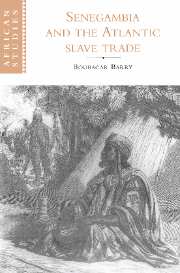Book contents
- Frontmatter
- Contents
- Preface
- Map
- I Senegambia from the fifteenth to the seventeenth century: a haven for incoming populations, a station for migrants on the move
- II Senegambia in the eighteenth century: the slave trade, ceddo regimes and Muslim revolutions
- III Senegambia in the first half of the nineteenth century: legitimate trade and sovereignty disputes
- 9 The crisis of the trans-Atlantic trading system and the triumph of legitimate trade in the first half of the nineteenth century
- 10 Popular rebellions and political and social crises in Futa Jallon
- 11 Futa Jallon expansion into the Southern Rivers region
- 12 The colony of Senegal and political and social crises in northern Senegambia
- 13 Defeat of the holy warriors in northern Senegambia
- IV Senegambia in the second half of the nineteenth century: colonial conquest and resistance movements
- Conclusion
- Notes
- Bibliography
- Index
- Other books in the series
13 - Defeat of the holy warriors in northern Senegambia
Published online by Cambridge University Press: 31 October 2009
- Frontmatter
- Contents
- Preface
- Map
- I Senegambia from the fifteenth to the seventeenth century: a haven for incoming populations, a station for migrants on the move
- II Senegambia in the eighteenth century: the slave trade, ceddo regimes and Muslim revolutions
- III Senegambia in the first half of the nineteenth century: legitimate trade and sovereignty disputes
- 9 The crisis of the trans-Atlantic trading system and the triumph of legitimate trade in the first half of the nineteenth century
- 10 Popular rebellions and political and social crises in Futa Jallon
- 11 Futa Jallon expansion into the Southern Rivers region
- 12 The colony of Senegal and political and social crises in northern Senegambia
- 13 Defeat of the holy warriors in northern Senegambia
- IV Senegambia in the second half of the nineteenth century: colonial conquest and resistance movements
- Conclusion
- Notes
- Bibliography
- Index
- Other books in the series
Summary
Shaykh Umar's defeat at Medina in 1857 forced the holy warrior to turn his attention exclusively to the construction of a new empire to the east of Senegambia. The task absorbed his energies until his death in 1864. Even so, he continued to influence the course of Senegambian history, partly through his fergo campaign, partly through the activities of his disciples, at a time when the region was having to face, in increasingly direct terms, the reality of colonial conquest.
The period saw the rise of an unbroken string of leaders in northern Senegambia, all intent on turning Shaykh Umar's vision into reality. These leaders challenged established aristocratic regimes. Their programs spilling over the frontiers of the old states, they set up large political units behind the banner of a militant Islam. From 1861 to 1867, throughout northern Senegambia from the Gambia River to the Senegal, Maba Jaakhu stood out as the greatest disciple of Shaykh Umar. At one point he succeeded in uniting the Muslim community, and in ihe process directly challenged the French presence in the region. After the failure of Maba Jaakhu came Cherno Brahim, followed by Amadu Seekhu. All, in the name of orthodox Islam, shook up this region, starting with Futa Toro, from 1869 to 1875. In their holy war, Maba Jaakhu the disciple of Shaykh Umar, Amadu Seekhu the Madiyu, and Cherno Brahim the disciple of Shaykh Siddiiya Al Kabir, aroused the resistance of established political authorities.
- Type
- Chapter
- Information
- Senegambia and the Atlantic Slave Trade , pp. 195 - 206Publisher: Cambridge University PressPrint publication year: 1997



